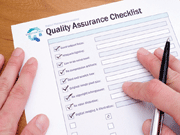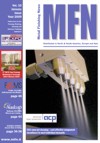E-Archive
Nadcap Column
in Vol. 10 - January Issue - Year 2009
When no-one is looking...


It is, of course, important to perform well during an external audit, whether it’s a customer or third-party audit. But it’s equally important – if not more so – to maintain the quality when no external audit is being conducted.
In the words of Henry Ford, American industrialist and pioneer of the assembly-line production method: “Quality means doing it right when no one is looking.”
But how do you ensure that it’s being done right? For any organization serious about quality, an effective internal auditing program is vital.
Internal auditing is an independent, objective assurance and consulting activity designed to assess the degree of conformance of a process or system to the requirements placed on that system; and to be a springboard for improving the organization’s operations.
In other words, there are two key objectives: compliance and continual improvement.
Establishing an effective internal auditing program is not easy. An obstacle may be that staff are used to external audits, where having a non-conformance identified is undesirable. This means that a lack of open communication can be part of an external audit. However, in an internal audit, the goal is to build a team between the auditor and the person being audited so that together, they can identify any weaknesses in the system. These can then be fixed before the external audit.
“One hour spent in pre-audit preparation saves around five hours after the audit.” Larry O’Dell, Manager, European Region Supplier "Partner" Quality Material Division for The Boeing Company.
To ensure an effective internal auditing program, there are four natural focus areas:
1. The quality system: The quality system is best represented by the company quality manual. Depending how detailed the quality manual is, there may be many or few elements which are auditable.
2. Company policies & procedures: Company policies do not usually contain a lot of detailed “how to” information but they should still be reviewed for auditable information and actions. Procedures, however, are filled with auditable material. The purpose of a procedure is to standardize how an activity is carried out ie the optimum way so this should form an important part of the internal audit.
3. Manufacturing and office procedures: These should provide a lot of auditable information and can be audited using the process approach and job audits.
In a process audit, the auditor starts at the beginning of the process and follows it through each step asking questions such as: Is this how the process is documented? Is the practice on the floor the same as the one that is documented? Is it effective?
Meanwhile, a job audit ensures that all steps in the process are designed to give the desired outcome. The auditor will witness all critical functions as they come together to make a plan which will give conforming, repeatable results.
4.The product: Ultimately, the customer is not purchasing the processes but the product. So the internal auditing program must audit the product to verify the effectiveness of the controls on the process. These are usually “inspection-based” audits.
Each of these requires attention to ensure an effective internal auditing program, which should also use the principles of PDCA:
Plan: Develop the internal audit plan
Do: Conduct the internal audit (including 1 – 4 above)
Check: Evaluate the effectiveness of the internal audit
Act: Make any necessary corrections to the internal audit program
There are many decisions to make when developing an internal auditing program such as: how often to audit; which areas to audit; how much time to spend auditing; who to assign the responsibility of auditing; etc.
All of these decisions are as important as the internal audit itself because it all represents responsible preparation for an external audit and an appreciation of the value of the work that your company completes for its customers and the industry.
As part of PRI’s Customer Solutions & Support, PRI has worked with quality industry experts to develop quality-focused professional development programs including Internal Auditing. To learn more about Internal Auditing, visit www.eQuaLearn.com




























